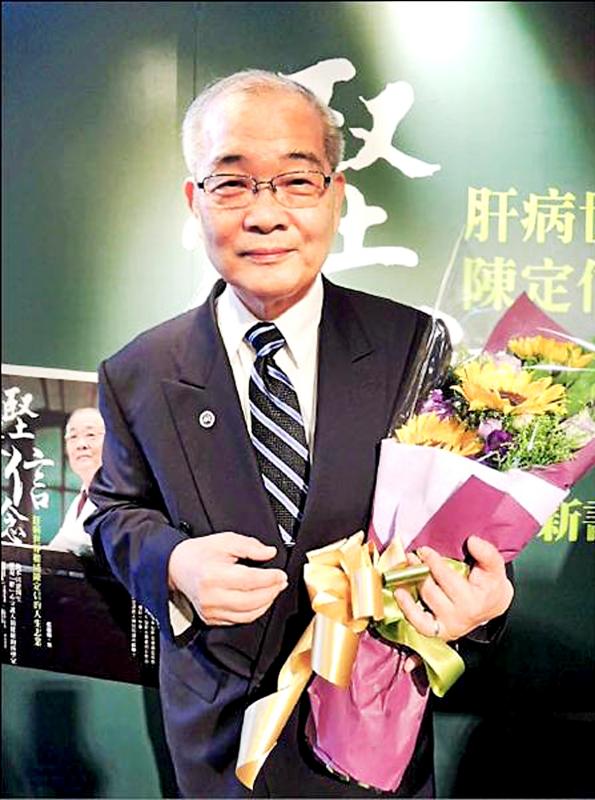Academia Sinica’s Chen Ding-shinn (陳定信), the nation’s leading authority on hepatitis, died from pancreatic cancer at National Taiwan University Hospital on Wednesday. He was 76.
Born on July 6, 1943, in then-Taipei County’s Yingge Township (鶯歌), Chen was a student of National Taiwan University College of Medicine professor Sung Juei-low (宋瑞樓), dubbed the Taiwanese father of liver disease research.
Chen attributed his dedication to the study of liver diseases to his father dying of liver cancer when he was in his senior year in college and to his contracting hepatitis A when he was in elementary school.

Photo: Yang Yuan-ting, Taipei Times
He was in the original group that persuaded the government to introduce hepatitis B preventive measures, leading to the government’s introduction of a mass vaccination program in 1984, the first nation in the world to do so.
To overcome public resistance to the program, Chen and Sung appeared on TV and radio to promote it.
To date, the program has benefitted 8 million Taiwanese.
Chen and his team finalized the genetic sequencing of the Taiwan strain of the hepatitis C virus, paving the way for the development of a treatment using short-term interferon alongside Ribavirin.
That became the foundation for the development of a treatment using long-term interferon with Ribavirin.
Although Chen retired in 2013, he continued to go to his office daily to conduct research and teach students during clinical treatment sessions, National Taiwan University Hospital vice superintendent Wu Ming-shiang (吳明賢) said.
A doctor can only save one life through treatment, but through top-notch research, they can help many, Wu quoted Chen as saying, adding that Chen was a role model for Taiwanese physicians.
Chen’s decision to remain in Taiwan was a boon for the nation’s medical sector, Wu said, citing how Chen had saved the Gastroenterological Society of Taiwan by virtue of his reputation alone when the society was at risk of being removed from the World Gastroenterological Organization due to Chinese interference.
Academia Sinica on Wednesday night also issued a statement in remembrance of Chen.
Chen’s research on hepatitis B and C, and his influence on related policymaking, made Taiwan a world leader in liver disease research, Academia Sinica President James Liao (廖俊智) said.
Over the past few months, Chen also served as a consultant for the institution’s team researching COVID-19, even though he was unwell, Liao said, expressing deep regret over losing such a valuable mentor.
Additional reporting by Yang Yuan-ting and Lin Chia-nan

A small number of Taiwanese this year lost their citizenship rights after traveling in China and obtaining a one-time Chinese passport to cross the border into Russia, a source said today. The people signed up through Chinese travel agencies for tours of neighboring Russia with companies claiming they could obtain Russian visas and fast-track border clearance, the source said on condition of anonymity. The travelers were actually issued one-time-use Chinese passports, they said. Taiwanese are prohibited from holding a Chinese passport or household registration. If found to have a Chinese ID, they may lose their resident status under Article 9-1

Taiwanese were praised for their composure after a video filmed by Taiwanese tourists capturing the moment a magnitude 7.5 earthquake struck Japan’s Aomori Prefecture went viral on social media. The video shows a hotel room shaking violently amid Monday’s quake, with objects falling to the ground. Two Taiwanese began filming with their mobile phones, while two others held the sides of a TV to prevent it from falling. When the shaking stopped, the pair calmly took down the TV and laid it flat on a tatami mat, the video shows. The video also captured the group talking about the safety of their companions bathing

PROBLEMATIC APP: Citing more than 1,000 fraud cases, the government is taking the app down for a year, but opposition voices are calling it censorship Chinese Nationalist Party (KMT) Chairwoman Cheng Li-wun (鄭麗文) yesterday decried a government plan to suspend access to Chinese social media platform Xiaohongshu (小紅書) for one year as censorship, while the Presidential Office backed the plan. The Ministry of the Interior on Thursday cited security risks and accusations that the Instagram-like app, known as Rednote in English, had figured in more than 1,700 fraud cases since last year. The company, which has about 3 million users in Taiwan, has not yet responded to requests for comment. “Many people online are already asking ‘How to climb over the firewall to access Xiaohongshu,’” Cheng posted on

A classified Pentagon-produced, multiyear assessment — the Overmatch brief — highlighted unreported Chinese capabilities to destroy US military assets and identified US supply chain choke points, painting a disturbing picture of waning US military might, a New York Times editorial published on Monday said. US Secretary of Defense Pete Hegseth’s comments in November last year that “we lose every time” in Pentagon-conducted war games pitting the US against China further highlighted the uncertainty about the US’ capability to intervene in the event of a Chinese invasion of Taiwan. “It shows the Pentagon’s overreliance on expensive, vulnerable weapons as adversaries field cheap, technologically